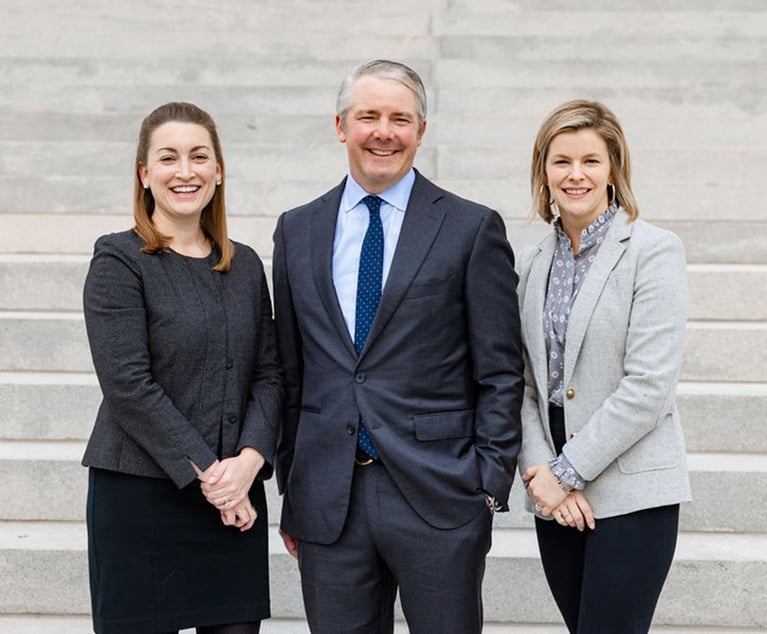Lawmakers Get Started on Bills Aimed at Lobbyist Influence
One of the centerpiece bills would bar state officials, including lawmakers, from letting a lobbyist pay for their transportation, lodging, recreation or entertainment, and limiting gifts from lobbyists to $250 in value each year.
October 26, 2021 at 01:30 PM
4 minute read
 Pennsylvania State Capitol. Photo: Zack Frank/Shutterstock
Pennsylvania State Capitol. Photo: Zack Frank/Shutterstock
Pennsylvania's state House of Representatives on Monday began advancing a package of bills aimed at lobbyist influence, including limiting gifts from lobbyists and prohibiting lobbyists from trying to influence an elected official for whom they also worked as a campaign strategist.
The bills won passage in the House State Government Committee, and require floor votes in both the House and Senate to get to Gov. Tom Wolf.
One of the centerpiece bills would bar state officials, including lawmakers, from letting a lobbyist pay for their transportation, lodging, recreation or entertainment, and limiting gifts from lobbyists to $250 in value each year.
Wolf in 2015 banned employees under his jurisdiction from accepting gifts of any amount, but lawmakers still allow themselves to accept gifts in unlimited quantities from anyone seeking to influence them.
That has prompted demonstrators from MarchOnHarrisburg to interrupt legislative voting sessions in recent years, protest at lawmakers' offices and mount a "stop taking bribes" campaign aimed at lawmakers.
Gift-ban legislation has been introduced before and died.
But MarchOnHarrisburg's executive director, Michael Pollock, said he is optimistic that the group can get enough key members of House and Senate Republican leadership on board this time to win passage of what the group sees as an essential anti-corruption measure.
MarchOnHarrisburg's members have sought, without success, to get a commitment from Senate President Pro Tempore Jake Corman. They also showed up at his golf course fundraiser earlier this month and, on Monday, tried to talk to him about it in the Capitol.
"He got out of the conversation as quickly as he could with a 'no comment,'" Pollock said.
Corman's office separately declined comment on whether he supports a gift ban.
Lawmakers and other candidates for state office in Pennsylvania can still accept campaign contributions in any amount from any person, including lobbyists and people who get contracts from state agencies or the Legislature.
Lobbyists, their clients and trade associations in Pennsylvania also routinely provide lawmakers with free meals, travel and tickets to sporting events, destination conferences or entertainment venues.
Most other states have laws limiting the extent of gifts that lawmakers may accept, according to the National Conference on State Legislatures.
Lawmakers in Pennsylvania have made no move to impose so-called pay-to-play rules or limit campaign contributions, although both chambers approved internal chamber rules banning most types of cash gifts to members in 2014 following a scandal.
Another centerpiece bill is aimed at lobbyists or lobbying firms that also provide campaign management services, legislation sought since at least 2015 by a handful of Republican state senators complaining about the growing influence of such firms connected to top GOP lawmakers.
Under it, a lobbyist would be prohibited from trying to influence a state official, or an employee on the official's staff, after having served as a campaign consultant to the official.
The prohibition lasts for that elected term and also applies to a lobbyist who had a financial interest in a firm that provided campaign services.
A separate bill targets the revolving door between lobbyists and the Legislature's staff. It would prohibit a legislative employee from being lobbied for a year by colleagues at their former lobbying firm.
Several bills address transparency.
One would require lobbyists to bolster their reporting to the state by disclosing their ownership stake in a lobbying firm. A second would require lobbying firms to disclose instances when they ask a client to waive a conflict of interest that the lobbying firm has with another client.
Another bill bans lobbyists, lobbying firms and their clients from giving or receiving referral fees.
Yet another bill would bar a state entity from hiring lobbyists or campaign consultants to influence another state entity.
This content has been archived. It is available through our partners, LexisNexis® and Bloomberg Law.
To view this content, please continue to their sites.
Not a Lexis Subscriber?
Subscribe Now
Not a Bloomberg Law Subscriber?
Subscribe Now
NOT FOR REPRINT
© 2025 ALM Global, LLC, All Rights Reserved. Request academic re-use from www.copyright.com. All other uses, submit a request to [email protected]. For more information visit Asset & Logo Licensing.
You Might Like
View All


Law Firms Funnel Millions to Congressional Races, Though Skew Toward Dems
4 minute read
From Many to One: McNees Wallace Rebrands Government Relationships Groups
4 minute readTrending Stories
- 1A Message to the Community: Meeting the Moment in 2025
- 2Ex-Prosecutor Denies on Witness Stand That She Tried to Protect Ahmaud Arbery's Killers
- 3Latham's Lateral Hiring Picks Up Steam, With Firm Adding Simpson Practice Head, Private Equity GC
- 4Legal Restrictions Governing Artificial Intelligence in the Workplace
- 5Failure to Adequately Inform Patients
Who Got The Work
J. Brugh Lower of Gibbons has entered an appearance for industrial equipment supplier Devco Corporation in a pending trademark infringement lawsuit. The suit, accusing the defendant of selling knock-off Graco products, was filed Dec. 18 in New Jersey District Court by Rivkin Radler on behalf of Graco Inc. and Graco Minnesota. The case, assigned to U.S. District Judge Zahid N. Quraishi, is 3:24-cv-11294, Graco Inc. et al v. Devco Corporation.
Who Got The Work
Rebecca Maller-Stein and Kent A. Yalowitz of Arnold & Porter Kaye Scholer have entered their appearances for Hanaco Venture Capital and its executives, Lior Prosor and David Frankel, in a pending securities lawsuit. The action, filed on Dec. 24 in New York Southern District Court by Zell, Aron & Co. on behalf of Goldeneye Advisors, accuses the defendants of negligently and fraudulently managing the plaintiff's $1 million investment. The case, assigned to U.S. District Judge Vernon S. Broderick, is 1:24-cv-09918, Goldeneye Advisors, LLC v. Hanaco Venture Capital, Ltd. et al.
Who Got The Work
Attorneys from A&O Shearman has stepped in as defense counsel for Toronto-Dominion Bank and other defendants in a pending securities class action. The suit, filed Dec. 11 in New York Southern District Court by Bleichmar Fonti & Auld, accuses the defendants of concealing the bank's 'pervasive' deficiencies in regards to its compliance with the Bank Secrecy Act and the quality of its anti-money laundering controls. The case, assigned to U.S. District Judge Arun Subramanian, is 1:24-cv-09445, Gonzalez v. The Toronto-Dominion Bank et al.
Who Got The Work
Crown Castle International, a Pennsylvania company providing shared communications infrastructure, has turned to Luke D. Wolf of Gordon Rees Scully Mansukhani to fend off a pending breach-of-contract lawsuit. The court action, filed Nov. 25 in Michigan Eastern District Court by Hooper Hathaway PC on behalf of The Town Residences LLC, accuses Crown Castle of failing to transfer approximately $30,000 in utility payments from T-Mobile in breach of a roof-top lease and assignment agreement. The case, assigned to U.S. District Judge Susan K. Declercq, is 2:24-cv-13131, The Town Residences LLC v. T-Mobile US, Inc. et al.
Who Got The Work
Wilfred P. Coronato and Daniel M. Schwartz of McCarter & English have stepped in as defense counsel to Electrolux Home Products Inc. in a pending product liability lawsuit. The court action, filed Nov. 26 in New York Eastern District Court by Poulos Lopiccolo PC and Nagel Rice LLP on behalf of David Stern, alleges that the defendant's refrigerators’ drawers and shelving repeatedly break and fall apart within months after purchase. The case, assigned to U.S. District Judge Joan M. Azrack, is 2:24-cv-08204, Stern v. Electrolux Home Products, Inc.
Featured Firms
Law Offices of Gary Martin Hays & Associates, P.C.
(470) 294-1674
Law Offices of Mark E. Salomone
(857) 444-6468
Smith & Hassler
(713) 739-1250





